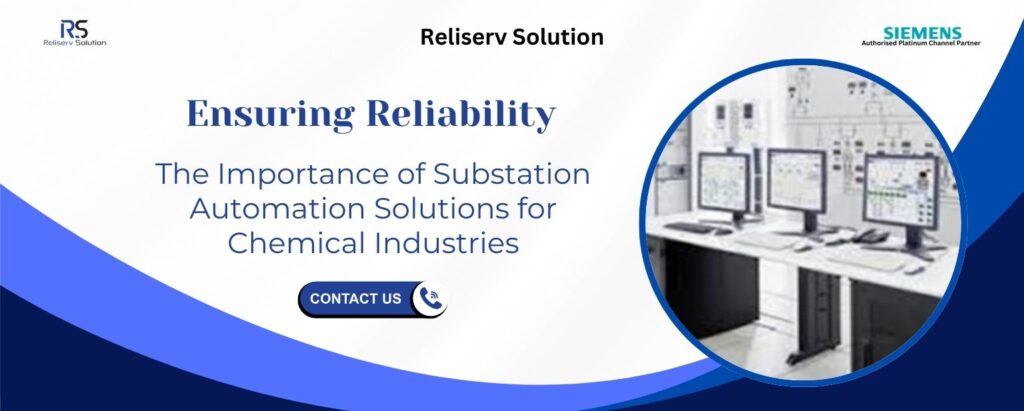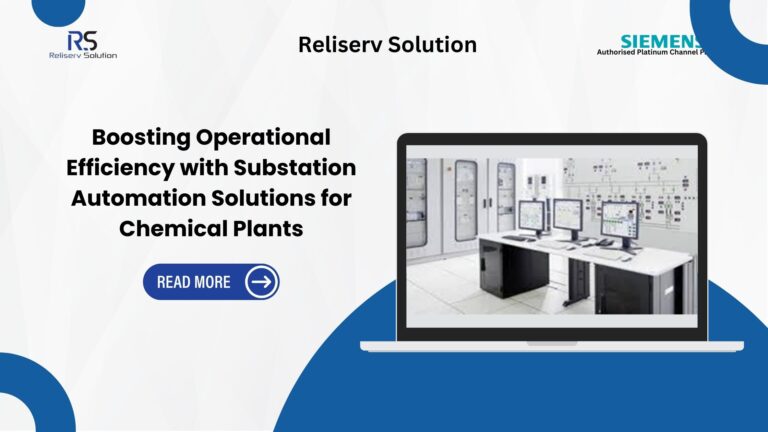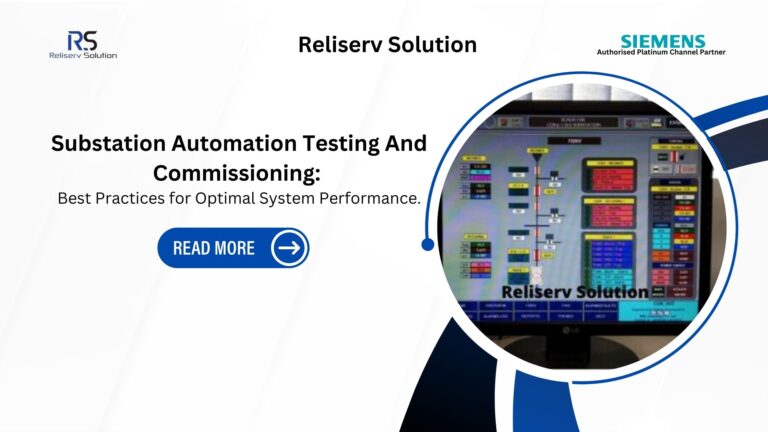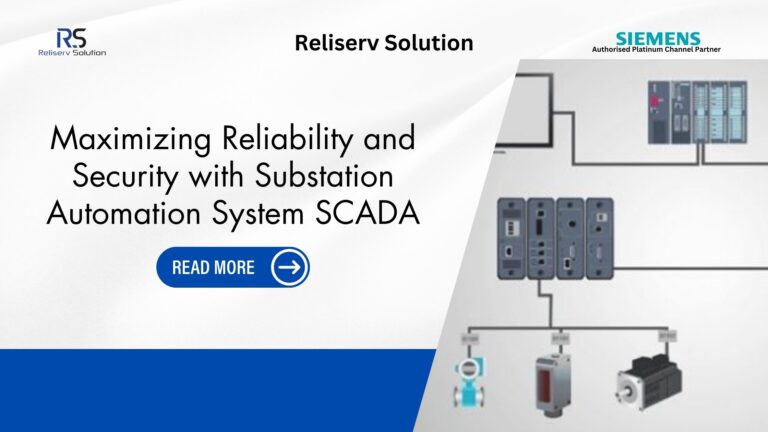In today’s highly industrialized world, reliability in power systems is crucial, especially for sectors like the chemical industry, where operational stability is paramount. Chemical industries demand a continuous and stable power supply to sustain their sensitive processes, and any disruption can result in severe consequences, including substantial financial losses, safety risks, and production delays. Therefore, integrating Substation Automation Solutions for Chemical Industries becomes not just beneficial but essential.
In this blog, we will explore why Substation Automation Solutions for Chemical industries are essential for maintaining reliability and efficiency. We’ll discuss how they contribute to enhanced operational control, improved safety, and cost savings. Additionally, we’ll take a look at factors to consider when evaluating Automation Solutions cost for Chemical Industries and choosing a reputable Automation Solutions Provider for Chemical Industries.
The Significance of Substation Automation Solution for Chemical Industries
Substation automation has become a pivotal component for industries aiming to optimize their power management systems. For chemical industries, the stakes are higher, as even a minor disruption in power can lead to significant operational setbacks. Automation Solutions for Chemical Industries are essential because they offer:
- Enhanced Monitoring and Control: The most significant advantage of Substation Automation Solutions for Chemical industries is improved monitoring and control. Automation solutions provide real-time data, which helps operators to make informed decisions instantly. Advanced monitoring systems also enable predictive maintenance by identifying potential issues before they escalate, thus ensuring that the entire system runs smoothly.
- Increased Reliability and Availability: Reliability is the cornerstone of any power distribution system, particularly in industries where downtime is costly. Automation Solutions for Chemical Industries facilitate seamless switching, load balancing, and fault management, which ensures that the power supply remains stable and reliable.
- Optimized Resource Utilization: Automation enables the optimal utilization of resources, which is essential for reducing operational costs. By using Substation Automation Solutions for Chemicals, industries can minimize waste and maximize the efficiency of their power distribution networks. Automation also reduces the need for manual interventions, which can lead to operational errors and inefficiencies.
- Improved Safety: Safety is a primary concern in chemical industries due to the hazardous nature of many processes and materials involved. Automation Solutions for Chemical Industries enhance safety by reducing the need for manual operation, thus minimizing the risk of human error.
- Scalability and Flexibility: The power requirements of chemical industries can vary based on production demands. Substation Automation Solutions for Chemical industries provide the scalability and flexibility needed to adapt to changing power needs. Automated systems can be easily modified to accommodate expansions or upgrades, making them a future-proof solution for growing industries.

Key Components of Substation Automation Solutions for Chemical Industries
A comprehensive Automation Solution for Chemical Industries systems typically includes several key components designed to ensure the efficient and reliable operation of power distribution systems. Here are some critical components that play a vital role in substation automation:
- Intelligent Electronic Devices (IEDs): IEDs are essential for monitoring and controlling substation equipment. They collect data, perform protection functions, and communicate with other devices within the automation system. In Substation Automation Solutions for Chemical Industries, IEDs enable real-time monitoring and help maintain system stability.
- Supervisory Control and Data Acquisition (SCADA) Systems: SCADA systems are used for remote monitoring and control of substation operations. They provide a centralized platform for managing various substation components and facilitate data analysis, which is crucial for decision-making.
- Programmable Logic Controllers (PLCs): PLCs are crucial for automating various processes within substations. They help execute control functions and ensure that systems operate as expected. In Automation Solutions for Chemical Industries, PLCs play a significant role in maintaining consistent power supply by automating switching and load management tasks.
- Human-Machine Interface (HMI): HMI systems enable operators to interact with the automation system, providing a user-friendly interface for monitoring and control. With HMI systems, operators can quickly access information, diagnose issues, and make adjustments as needed. In the context of Substation Automation Solutions for Chemical Industries, HMI systems enhance operational efficiency and support better decision-making.
- Communication Networks: Reliable communication is critical for substation automation. Communication networks connect various components, ensuring seamless data exchange between devices.
Factors to Consider When Evaluating Automation Solutions Cost for Chemical Industries
While Substation Automation Solutions for Chemical Industries offer significant benefits, it’s essential to consider the cost factors associated with their implementation. Here are some key cost-related considerations:
- Initial Investment: The initial investment includes the cost of hardware, software, and installation. Depending on the complexity of the system, this cost can vary significantly.
- Maintenance and Upkeep: Automation systems require regular maintenance to ensure they continue to operate effectively. Maintenance costs can include software updates, hardware repairs, and periodic inspections.
- Training and Support: Training operators and personnel to use the automation system effectively is an essential cost consideration.
- Scalability Costs: If the chemical industry’s power needs grow, scalability costs may be incurred to expand the automation system.
- Return on Investment (ROI): While upfront costs can be substantial, Substation Automation Solutions for Chemical Industries often deliver a strong ROI by enhancing reliability, reducing downtime, and lowering maintenance expenses.
Choosing an Automation Solutions Provider for Chemical Industries
Selecting the right Automation Solutions Provider for Chemical Industries is crucial for ensuring the successful implementation and operation of substation automation solutions. When selecting a provider, keep the following things in mind:
- Experience and Expertise: Look for a provider with extensive experience in substation automation, particularly within the chemical industry. An experienced provider will understand the unique challenges and requirements of chemical industries, ensuring that they deliver a solution tailored to your needs.
- Comprehensive Support Services: A reliable provider should offer comprehensive support services, including installation, maintenance, training, and troubleshooting. Support services are essential for ensuring that the automation system operates smoothly and that operators are well-equipped to handle any issues that may arise.
- Quality of Products: Choose a provider that offers high-quality, reliable components for substation automation. Quality products are essential for ensuring that the system remains dependable and performs optimally in demanding environments.
- Scalability Options: Select a provider that offers scalable solutions to accommodate future growth. Scalability is essential for chemical industries, where power demands can change based on production needs. A scalable solution will ensure that your automation system can adapt to changes without requiring a complete overhaul.
- Reputation and Customer Feedback: Research the provider’s reputation and customer feedback to gauge their reliability and customer satisfaction. A provider with positive reviews and a strong track record is more likely to deliver a successful automation solution.
Conclusion
In conclusion, Substation Automation Solutions for Chemical Industries are indispensable for ensuring reliable power supply and operational efficiency. These solutions offer numerous benefits, including enhanced monitoring and control, increased reliability, optimized resource utilization, improved safety, and scalability. By investing in Automation Solutions for Chemical Industries, chemical companies can reduce downtime, improve safety, and achieve cost savings over the long term.
When evaluating Automation Solutions cost for Chemical Industries, it’s essential to consider factors such as initial investment, maintenance, training, scalability, and ROI. Choosing a reputable Automation Solutions Provider for Chemical Industries is crucial for ensuring the successful implementation and operation of the automation system.
Overall, Substation Automation Solutions for Chemical Industries provide the reliability and efficiency needed to maintain stable operations in the chemical industry. By partnering with the right provider and investing in a robust automation solution, chemical companies can achieve the reliability and efficiency required to thrive in today’s competitive landscape.
Reliserv Solution is an authorized supplier, distributor, and Platinum Channel Partner of Siemens, with its main office located in Mumbai, Maharashtra. The panel-building industry as well as other industries may benefit from a range of our specialized services and solutions. Please contact us by phone at +917506112097 or by email at [email protected] if you need help or have any questions. To view a list of all the Automation Solutions we offer, click here. Along with a vast array of other Automation solutions, we offer well-known Substation Automation Solutions for Chemical Industries.



